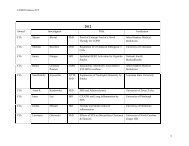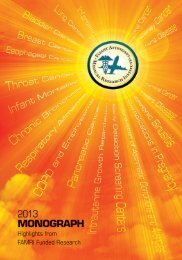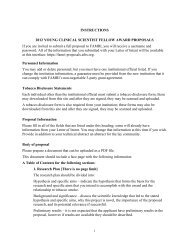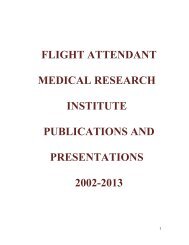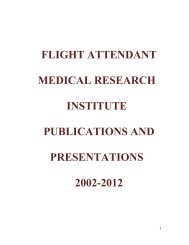MISSION
2009 compendium of FAMRI-supported research - Flight Attendant ...
2009 compendium of FAMRI-supported research - Flight Attendant ...
You also want an ePaper? Increase the reach of your titles
YUMPU automatically turns print PDFs into web optimized ePapers that Google loves.
45, NPV = 8%), 3 months (n = 42, NPV = 79%), and 6 months (n = 46, NPV = 91%) post-induction. The<br />
NPV increases to 88% when combining results from baseline and 6 weeks (n=16) and 92% when combining<br />
baseline, 6 weeks and 3 months (n = 13). When reviewing results independently for positive predictive<br />
value (PPV) at baseline, 6 weeks, 3 months, and 6 months, the results respectively are 35% (n = 66), 47%<br />
(n = 43), 47% (n = 43), and 43% (n = 21). When combining baseline and 6 week results there is a PPV of<br />
39% (n = 38); and combining baseline, 6 week and 3 month results gives a PPV of 52% (n = 23). A negative<br />
FISH at baseline and 6 weeks after induction of therapy predicts tumor-free status although further<br />
follow-up is required before definitive conclusions can be drawn.<br />
FAMRI Supported Publications<br />
Fomenkov A, Zangen R, Huang Y-P, Osada M, Guo Z, Fomenkov T, Trink B, Sidransky D, Ratovitski<br />
EA. RACK1 and stratifin target DeltaNp63alpha for a proteasome degradation in head and neck squamous<br />
cell carcinoma cells upon DNA damage. Cell Cycle 2004;3:1285-1295.<br />
Guo Z, Linn JF, Wu G, Anzick SL, Eisenberger CF, Halachmi S, Cohen Y, Fomenkov A, Hoque MO,<br />
Okami K, Steiner G, Engles JM, Osada M, Moon C, Ratovitski E, Trent JM, Meltzer PS, Westra WH,<br />
Kiemeney LA, Schoenberg MP, Sidransky D, Trink B. CDC91L1 (PIG-U) is a newly discovered oncogene<br />
in human bladder cancer. Nat Med 2004;10:374-381.<br />
Huang YP, Kim Y, Li Z, Fomenkov T, Fomenkov A, Ratovitski E. AEC-associated p63 mutations lead to<br />
alternative splicing/protein stabilization of p63 and modulation of notch signaling. Cell Cycle<br />
2005;4:1440-1447.<br />
Huang YP, Wu G, Guo Z, Osada M, Fomenkov T, Park HL, Trink B, Fomenkov A, Ratovitski EA.<br />
Altered sumoylation of p63a contributes to the split-hand/foot malformation phenotype. Cell Cycle<br />
2004;3:1587-1596.<br />
Wu G, Osada M, Guo Z, Fomenkov A, Begum S, Zhao M, Upadhyay S, Xing M, Wu F, Moon C, Westra<br />
WH, Koch WM, Mantovani R, Califano JA, Ratovitski E, Sidransky D, Trink B. DeltaNp63alpha upregulates<br />
the Hsp70 gene in human cancer. Cancer Res 2005;65:758-766.<br />
GENETIC AND EPIGENETIC ALTERATIONS IN BLADDER CANCER BY TOBACCO SMOKE<br />
Mohammad O. Hoque, DDS, PhD; The Johns Hopkins University; YCSA 2006<br />
Many of the toxins that enter the body after inhalation of cigarette smoke are absorbed into the bloodstream<br />
and excreted by the kidneys into the urine. Because urine stays in the bladder for hours before it is<br />
expelled, the bladder epithelium is exposed to prolonged contact with carcinogens absorbed from smoke.<br />
Recent evidence indicates that methylation and allelic deletion occur more frequently in cancers from<br />
smokers than non-smokers. These observations suggest that a useful tobacco signature could emerge from<br />
distinctive patterns of methylation and deletion. The objective of this study is to determine whether there<br />
are distinct patterns of chromosomal loss and methylation in smokers and non-smokers. The discovery of<br />
such patterns would be useful in the identification of bladder cancer-associated tumor suppressor genes.<br />
Additionally, these genes can be used for overall clinical management of bladder cancer patients such as initial<br />
diagnosis and monitoring of disease using urine sediment. To date, Dr. Hoque has been able to<br />
demonstrate that methylation of a panel of genes can be used for diagnosis of bladder cancer, using urine<br />
sediment. He also reported that stratification of tumor stage could be possible by profiling methylation<br />
markers. By a multivariate analysis, Dr. Hoque reported that tissue inhibitor of metalloproteinases-3<br />
methylation was an independent prognostic factor for bladder cancer survival with stage and metastasis (p<br />
= 0.001 and 0.02, respectively). An integrated genetic and epigenetic approach will be continued for the<br />
discovery of new genes, which should provide important insights into the pathogenesis of this tobaccorelated<br />
cancer, and will provide information to develop strategies for early detection and treatment.<br />
FAMRI Supported Publications<br />
Hoque MO, Kim MS, Ostrow KL, Liu J, Wisman BA, Park HL, Poeta ML, Jeronimo C, Henrique R,<br />
Lendvai A, Schuuring ED, Begum S, Rosenbaum R, Ongenaert M, Yamashita K, Califano J, Westra<br />
WH, Zee VD, Criekinge WV, Sidransky D. Genome-wide promoter analysis uncovers portions of the<br />
cancer methylome. Cancer Res 2008;68(8):2661-70.<br />
Dasgupta S, Hoque MO, Upadhyay S, Sidransky D. Mitochondria encoded cytochrome B mutation promotes<br />
tumor growth in bladder cancer through NFkB2 activation. Cancer Res 2008;68:700-706.<br />
Hoque MO, Begum S, Brait M, Jeronimo C, Ostrow K, Trock B, Westra WH, Schoenberg M, Sidransky<br />
D. TIMP3 promoter methylation is an independent prognostic factor for bladder cancer. J Urol<br />
2008;179(2):743-7.<br />
6 2 P A G E



